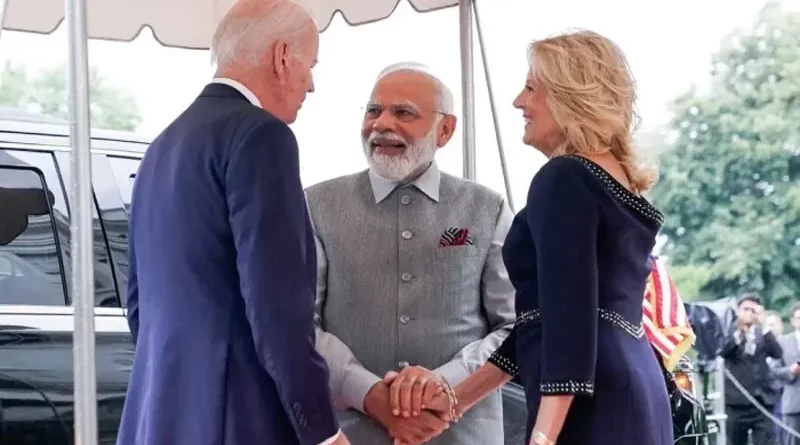US rolls out red carpet to welcome Modi with chips, jets investment on agenda
US President Joe Biden is hosting Indian Prime Minister Narendra Modi for a state visit, which is expected to result in significant deals on fighter jet engines, semiconductors, and space.
Washington is looking to strengthen its ties with New Delhi despite concerns over India’s ties to Russia and the growing authoritarianism of the Modi government.
During the visit, Modi will address a joint session of Congress and participate in a gala dinner hosted by First Lady Jill Biden.
One of the biggest agreements of the visit is the technology transfer for engines as India begins producing homegrown fighter jets. The deal will allow General Electric to produce its F414 engines jointly with state-owned Hindustan Aeronautics.
The US is also expected to sign deals to provide India with high-precision armed drones. The US hopes that a tighter defence relationship with India will help wean the country off Russia, which was its primary military supplier during the Cold War.
India has refused to join Western efforts to isolate Russia over its invasion of Ukraine. Instead, India has seized on the crisis to buy discounted Russian oil. The visit reflects a calculated show of full-throated US support for India, despite concerns over the country’s ties to Russia and the growing authoritarianism of the Modi government.
US chip giant Micron will invest $800 million in a semiconductor assembly and testing plant in India, which is expected to reach $2.75 billion after contributions from New Delhi.
The plant will advance a goal of diversifying supply chains of advanced semiconductors, as Biden leads a concerted effort to deny exports of top-end chips to China.
India, a growing power in space, also agreed during Modi’s visit to join the Artemis Accords, a US-led multinational effort to put a human back on the Moon by 2025. As part of the cooperation, India’s space program will work with Nasa on a joint mission to the International Space Station next year.
The United States has been seeking a closer relationship with India since the late 1990s, seeing the billion-plus democracy as like-minded on the challenges both of China and radical Islamism. Biden already welcomed Modi to the White House as part of a summit of the so-called Quad — an initiative of four democracies including Japan and Australia that is widely seen as countering China’s influence in Asia.
Modi had developed a close relationship with Biden’s predecessor Donald Trump, endearing himself by arranging a massive rally in his home state of Gujarat for the fellow right-wing populist.
The Biden administration has vowed a greater focus globally on human rights but has kept a light touch with Modi, who has exerted the Hindu majority’s identity in officially secular India. The State Department in its latest report on religious freedom pointed to attacks by police and vigilantes against minorities and inflammatory statements by members of Modi’s Bharatiya Janata Party.
Most Democrats are expected to attend the speech and the Biden administration has refrained from public criticism of Modi, seeing broader interests with India converging.

